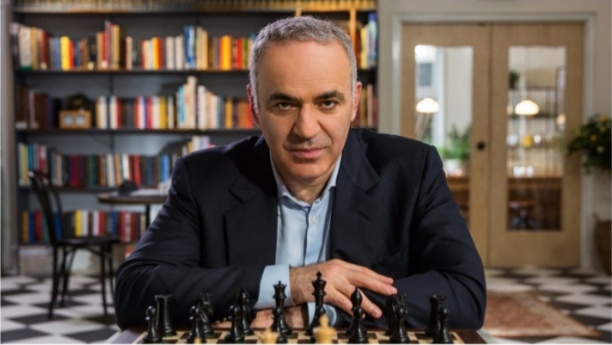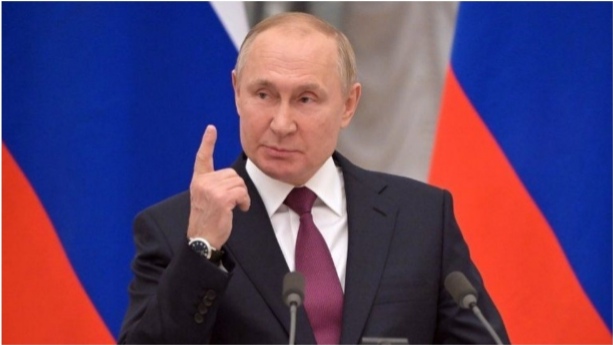The dictator’s gambit: What Putin is after on Ukraine.
7 min read
There is much in the news today about the “Ukraine crisis,” and while I’m glad to see that this major threat to the world order is finally worthy of attention, the naming gets it wrong. Ukraine doesn’t have a civil war, an insurgency or a separatist movement. Ukraine’s crisis is also Europe’s and America’s and now the world’s. It is a Russia crisis, or, more accurately, a Vladimir Putin crisis.
The United States and the rest of the world must get this right, because you cannot treat a disease if you start from the wrong diagnosis. You end up only treating the symptoms as they worsen, a downward spiral of reaction while the patient declines. What we need instead is a cure, a vaccine if you will.

President Biden and his predecessors have varied in rhetoric on Putin, but have had a pathetically similar track record when it comes to action, or inaction. Instead of addressing the bear in the room, Putin’s rogue mafia state, U.S. presidents and their peers in Europe prefer to fend off the worsening symptoms year after year.
Since I have been warning about the danger of allowing Putin’s cancer to spread for two decades, allow me a few “I told you sos” before getting to his latest appearance in the headlines. It was obvious to me that Putin would turn his aggression abroad as soon as he finished destroying Russian democracy and civil society. It’s the path of every dictator who runs out of scapegoats inside the country to blame for declining freedom and standard of living.
Putin’s invasions of neighboring Georgia in 2008 and Ukraine in 2014 were attacks on their nascent democracies, which he correctly saw as bad examples for the people of Russia. From assassinations in Europe with nuclear isotopes and nerve agents to election interference backing Brexit, Trump and extremist candidates across Europe, Putin has not stuck with his supposed ex-Soviet sphere of influence. This is what I meant when I wrote in 2007 that “Putin is our problem to solve, yes, but if he is unopposed, he will soon be a regional problem and then everyone’s problem.”
That was back when the leaders of the free world were still happy to pose in photos with “President Putin,” a few years before acknowledging he no longer deserved that democratic title. After rewarding his invasion of Georgia with Obama’s reset in 2008, it took another six long years and his attack on Ukraine and illegal annexation of Crimea to rouse the world to the fact he had become “Dictator Putin” and that there was no turning back.

Then came Trump, whose envy of and admiration for authoritarians was possibly his only sincere and consistent sentiment. Biden’s victory was supposed to herald a return to more traditional American foreign policy values after four years of Trump trying to drag the U.S. down to the amoral quid pro quo level of autocratic regimes.
Instead, Biden repeated his former boss Obama’s attempts to unilaterally declare peace with the man Biden accurately called “a killer” in March 2021. Instead of forceful deterrence, he elevated Putin with an early in-person summit, never explaining what exactly the U.S. needed from Russia other than to stop its campaign of aggression. Then the Biden administration came out on Putin’s side in the Nord Stream 2 pipeline deal between Russia and Germany, a lifeline for Putin and an energy garrote around Europe’s neck.
Biden is supposedly more concerned about China, an actual superpower competitor, but Putin has proved again he will stamp about until he receives the attention he craves. Now he is preparing a blow that has forced Europe and the U.S. to cease their policy of “We don’t talk about Vladimir.” He has amassed a huge invasion force on all sides of Ukraine, a sovereign democratic nation, geographically the largest country in Europe (discounting Russia), parts of which have been occupied by Russia since it first invaded in 2014.
Ukraine also contains 44 million Ukrainians, who are often forgotten during all these talks, exactly as Putin intends. He wants to be seen as the big boss making threats and deals, while Ukraine, which he doesn’t even acknowledge as an independent country, is little more than a buffer, a poker chip on the geopolitical table.
That Russia has to resort to brute force to buy a place at the table indicates how far the country has fallen under Putin’s misrule. Russia has become a gas station with nukes, with record numbers of the young and educated population running for the exits. Its disastrous COVID-19 response, arguably the worst in the world — yes, even worse than America’s — has crushed the population from the other demographic end thanks to an understandable lack of trust in the government and a lack of concern for human life by the regime.
(It’s no small irony that Putin’s disinformation army spreads anti-vaccine propaganda in the U.S. and all over the world to stir up strife while being unable to convince Russians to get vaccinated.)
Putin’s threat isn’t just to Ukraine, although he still has his defenders abroad. He has even succeeded in uniting Tucker Carlson and Bernie Sanders, who both want Russia’s fictional security concerns to be addressed.
Instead of negotiating over what Putin wants, the free world must unite and fight hard to make sure he doesn’t get anything he wants. Do not wait to retaliate for his next invasion; go after him and his oligarch mafia hard now to show him that this time he won’t be able to evade, weaken and wait out sanctions.
Reduce Putin’s leverage by substituting the energy he uses for blackmail. Kick Putin’s mafia state out of the international institutions it uses and abuses to spread corruption. Seize the hundreds of billions in assets he and his cronies hide in the West and kick out the oligarchs and their families. They use their looted money to buy friends and influence in the West, but it also gives these havens, especially the United Kingdom, tremendous leverage — should they have the courage to use it.
Putin, always the gambler and bluffer, is betting they don’t. He’s been right so many times in the past, after all. This isn’t to say Putin is some master strategist. He’s no chess player, as I’m qualified to say with confidence. He reads people, not the board, and he won’t move until he’s sure he will be able to claim victory thanks to his feckless opponents folding their superior hands. Putin relies on Europe and the U.S., despite their overwhelming military, financial and legal advantages, continuing their policy of “do nothing until you can say there’s nothing you can do.”
That’s why Putin is still occupying Crimea and Eastern Ukraine, not to mention parts of Georgia. Instead of acting quickly to defend his victims, the West dithered and blathered until they could say it was impossible to change things on the ground. Putin uses force first, then switches to calls for diplomacy and negotiation to solidify his gains. You could call it “a piece, then peace,” a tactic of 20th-century dictators.
But eventually the dictator goes too far. His finely tuned animal instincts of self-preservation and danger become blunted by too much success and he oversteps, leading to catastrophe. You never know when that moment may come, which is why the concept of deterrence during the Cold War was based on standing up to every small advance, so that little conflicts did not turn into big wars. And it worked.
More Russian forces are arriving from all sides every day. Putin has even brandished the unthinkable specter of nuclear weapons, the ultimate ploy to convince everyone he’s mad, and to just give him whatever he wants. His success with these tactics is how we got to this perilous point.
But Putin is a KGB man, a bully and a spy who traffics in shadows and doubt, not open war. As he has in Syria, Moldova and so many other places, he wants influence and chaos, not an open conflict he may lose. For as he well knows, that is how dictatorships fall, by looking fallible, vulnerable.
If Putin plays it safe, he will look for deniability, to claim victory without risk to his power and status. The modern hybrid war model his Russia invented will expand, with cyber-attacks, disinformation, and the weaponization of refugees and energy supplies. Belarus may lose the little independence it had while eyes are elsewhere. That will also allow cowardly Western leaders to claim that their tough talk did the job while Ukraine still suffers under debilitating occupation. They will all declare victory from well-appointed tables and at well-attended press conferences, while the real losers are those living under Putin’s violence and repression.
Meanwhile, Russian gas and oil will continue to flow out and the rivers of cash will continue to swirl, filling the pockets of Putin’s oligarchs, their corrupt enablers in the West, and loading the guns of Russia’s security and military forces so they’ll be better prepared next time. And there will be a next time, and a next, until Putin goes too far — or until the world decides he has gone far enough.
Ukraine has already suffered a high price and anything is possible in the coming days. The only thing we can be sure of is that if we fail to stand up to Putin now, the price will keep going up.
Garry Kasparov contributed this piece to New York Daily News.




